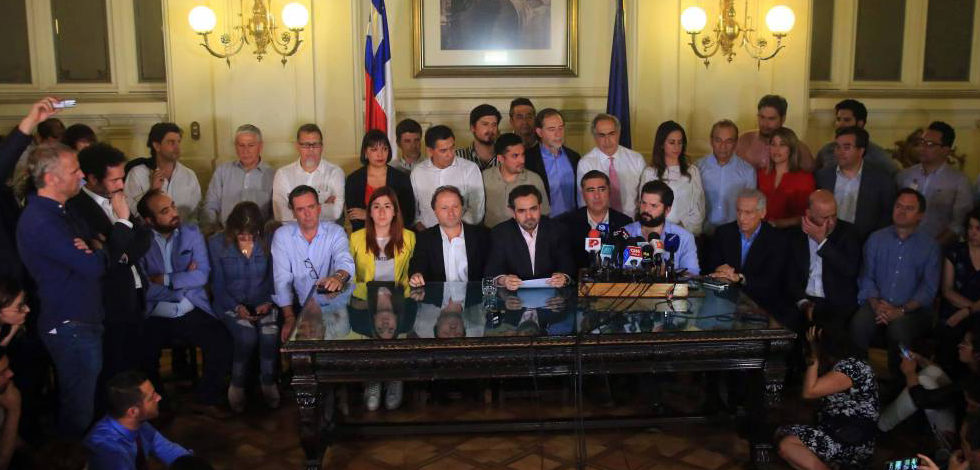Foto: Pauta.cl
[The following document was signed on November 15th by all parties with representation in the Chilean Congress, except the Communist Party. It has been translated into English by Bradley Hayes, coordinator of international programs at Yale Law School. The translation was reviewed by Rodrigo Correa, constitutional law professor at Universidad Adolfo Ibáñez]
In the face of the serious social and political crisis gripping the country and in response to the social mobilization and call from His Excellency President Sebastián Piñera, the representatives of the political parties who have signed this pact have agreed upon an institutional solution whose objective is attaining peace and social justice through an indisputably democratic process.
- The parties that have signed on to this agreement pledge their commitment to reestablishing peace and public order in Chile in total respect for human rights and the democratic institutions in place.
- A plebiscite will be held in April 2020 seeking answers to two questions:
- Do you want a new Constitution? Yes or no.
- What type of body should carry out the elaboration of a new Constitution? A mixed constitutional convention or a constitutional convention.
- A mixed constitutional convention shall consist, in equal parts, of representatives elected to the convention and members of parliament currently in office.
- If a constitutional convention is chosen, all the representatives will be elected for the purpose. The election to the constitutional convention would take place in October 2020 at the same time as the regional and municipal elections, under universal suffrage and following the electoral system for the election of deputies [i.e., members of the lower chamber of congress], in the corresponding proportion.
- The constituent body eventually chosen by the citizenry would have the sole objective of elaborating the new constitution. It will not impinge on the competences or attributes of the other organs or branches of the government and will be dissolved once the task it is given is completed. Furthermore, it will not be able to alter the quorums or the procedural rules for its deliberations and adoption of agreements.
- The constituent assembly will have to approve the norms and voting rules for them by a majority of two-thirds of its active members.
- The New Constitution will enter into force upon its promulgation and publication, organically replacing the current Constitution.
- Once the Basic Charter has been drafted by the constituent assembly, it will be ratified by plebiscite. The vote will be universal and obligatory.
- Those persons currently holding public or elected office will automatically cease in those offices by the force of law at the time their candidacy for electoral service on the constituent assembly is accepted. The members of the constituent assembly will be prohibited from seeking elected office for one year following the end of their mandate on the constituent assembly.
- The parties that have signed the present agreement will designate a Technical Commission that will determine all the aspects of the constituent process described above that are necessary for its realization. The composition of this commission will be proportionally designated by the governing and opposition coalitions.
- The constituent assembly will be given nine months to complete its task, with the option of one, non-repeatable extension of three months. The universal, obligatory ratification referendum will be held within sixty days of the new constitutional text’s submission by the constituent assembly. In no circumstances will this referendum be held within sixty days of any other popular vote.
- Any bills for constitutional and/or legal reforms emanating from this Agreement will be submitted to the Congress as a whole for approval. For those votes, the undersigned parties guarantee their support.

